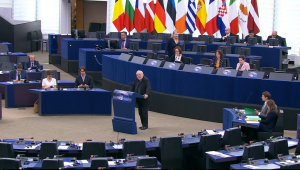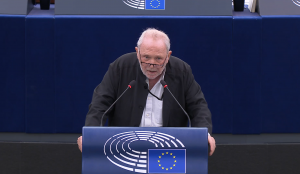Gérald Papy’s interview, published in Le Vif/L’Express on 7 November 2019
For Bernard Guetta, former journalist and Member of the European Parliament of the Renaissance list, the Central European countries’ transition to market economy was a success. But the shock therapy leading there left them with consequences which explain the democratic regression.
In your latest book, L’enquête hongroise (puis polonaise, italienne et autrichienne) you point out the fact that the current champions of illiberal democracy correspond geographically to the territory of the Austro-Hungarian Empire. Does the nostalgia for lost grandeur explain the disaffection with democracy?
There is certainly a nostalgia towards what used to be the power and the influence of the Austrian, then Austro-Hungarian Empire in the 19th century. You also have to take note of the fact that this very important part of the European continent was profoundly reactionary in the actual sense of the term. It was stung and terrified by modernity, which was embodied by France and Great Britain. Very strong anti-Westernism prevailed in this era, which had its roots in the immovable social order, a pre-eminence of the Catholic or Protestant churches, and also in imperial heritage. This anti-Westernism, today equally fed by the United States and Germany, expresses itself in a very deep rejection of the Enlightenment, the ideas of the French revolution and of the Republic; of freedom, equality, brotherhood and also in a rejection of the changing customs and morals of society. It is very important. In Western Europe, we absolutely do not realise the incredible cultural shock that the adoption of gay marriage means to a part of the population in these countries. For them, it is as if we had legalised cannibalism. Moreover, we do not express, at least for the most part, hostility towards Islam. This attitude is met with a total incomprehension in Central Europe, for the obvious reason that these countries have been occupied, or in the case of Austria, almost occupied by the Ottoman Empire until very recently on a historical scale. The serenity towards Muslim immigration is perceived in these countries as pure madness in the face of what feels to be a new invasion.
Aren’t these fears about Islam or the liberalisation of Western morals also motivated by the demographic fragility of these countries?
Of course. These are the countries whose youth took to emigration towards Germany, France, Belgium, Great Britain. The bravest, the most well educated, the best in foreign languages chose to live elsewhere. And they probably won’t return. These countries live in a fear of obliteration carried out by the absorption of their youth by these damned Western countries and by what is felt like a Mohammedan pressure on their borders.
In what ways did the communist period and the troubled transition towards democracy create the illiberal democracy?
The transition towards market economy and democracy was an incredible success. For those who, like me, knew these countries in the 1970s and 1980s and sees them again today, the transformation is stunning. The rapidity with which it has proceeded, the fact that people younger than 40 years have no idea any more what communism was, the sheer fact that these states function and develop with excellent growth rates, is a success. But it has been achieved during a period of around fifteen years, at such a social cost that the injury of this shock therapy is far from being healed. Even today, when everyone lives well or better, this fact does not compensate the savageness of this therapy, particularly in Poland, to a lesser extent in Hungary. In one half of the population a sentiment prevails, even if they do not express it this way, that the communists were not so wrong after all, that market economy is the triumph of bandits and democracy is the rule of the richest. This has led to the hatching, above all in Russia, then in Hungary and Poland, of this idea of the illiberal democracy. What does this concept embody? It is a political regime where there is always an election. But this election is distorted in the grasp of power over the means of communication by an omnipresent, heavy and violent propaganda. The elections results, at least in Central Europe are not tampered with. The proof is that the opposition has triumphed in Budapest and in ten of the largest Hungarian towns. The democracy is real. But it is illiberal, because it does not respect the freedom of expression, pluralism, independence of the judiciary, all that constitutes a real democracy by the existence of vigorous counter-powers.
One of the interlocutors in your book, András Lánczi, rector of the Corvinus University of Budapest praises the Hungarian-style majoritarian democracy, which he says thrives in the everyday life, not only in election times.
I rather think that the notion of “majoritarian democracy” means, to his mind, that once the majority expressed its will, the minorities’ only job is to shut up. It is literally a majoritarian democracy. Whereas real democracy implies precisely the respect of minorities; ethnic, cultural, but also political minorities. This “majoritarian democracy”, this is what Viktor Orbán and Jarosław Kaczyński would like to install, and which Vladimir Putin has institutionalised. Still, even in Russia it does not work so well. “Bad habits” have been taken up. And nowadays they cannot do away with the losses at elections. If they do so, they get put aside in the category of official dictatorships, which is not convenient…
How do you explain the ambiguity of these governments of Central Europe, which criticise the European Union, but, despite of the precedent created by Brexit, they don’t want to leave it?
If Hungary and Poland left the European Union, they would deprive themselves of the principal engine of their economic growth: the structural funds. Leaving the European Union is out of the question for them, because their leaders are no fools. Not only do they not want to leave the Union, they also make a stand on the side of the other countries against the British in the Brexit issue.
What do you think of Viktor Orbán’s theory that claims that the real melting pot of European values is in Central Europe?
For Viktor Orbán and Jarosław Kaczyński, Europe is Christianity, or rather the clerical apparatus of Christianity in their own, more conservative and reactionary version. For them, Europe is a homogeneous, white, Catholic or Protestant, but Christian, maybe Jewish population, but certainly not Arab or Muslim; it is the puritan moral of the 19th century. And we in the countries of Western Europe, we are unconscious, but active and terribly dangerous agents of organised decadence.
How to overcome this gap between such divergent tendencies in a democratic ensemble like the European Union? Do we have to make concessions to this other world vision?
How to overcome the difference in a democracy between conservatives and progressives, between supporters of the sexual revolution and the disciples of virginity until the wedding night? These issues can only be overcome in tension, in difficulty, precisely through the means of democracy. The disagreements are strong in the European Union. But there were tensions between president François Hollande, promoter of freedom of “Mariage pour tous”, and the members of La Manif pour tous. There was a real split. It was overcome by democracy.
How do you explain that in Hungary and even more in Poland, the political left is so crushed?
How do you explain that it is similarly crushed in France and it is taking a dive in Germany? We are witnessing a crisis of the progressive side in the whole world. Potentially because of a lack of ideas. It is not the first time that this happens. But maybe, without even realising it, we are reaching a new turning point. What is being said at the demonstrations, which have been shaking up the world on five continents for six months, is obviously a claim for political freedoms, democracy, the rule of law; it is very much about the fight against corruption, the expulsion of the incapable and the corrupt. It is an expression of a claim to return to the State that defends the weakest, as an arbitrator between capital and labour, after forty years of uninterrupted triumph of neoliberal ideas, of Thatcherism. Maybe we are witnessing the big return of Keynes and “the arbitrator state”. And if, which is not certain but not impossible either, if Donald Trump is beaten within a year, it will be done by a Democratic candidate from much farther left than what the United States have ever had since Roosevelt and the New Deal. Maybe it is the United States that will give us, how amazing, the big return of the Left.
On the other hand, isn’t a sharp orientation towards the left a handicap for the Democratic frontrunners, if they hope to defeat Trump?
One tends to think so, looking at things from the outside, notably from Europe. One would think that who is needed is someone like Bill or Hillary Clinton, like Tony Blair, like Emmanuel Macron, a centre-right/centre-left, very moderate character, who can prevail over Trump by winning over the independent electorate. It might be an error to think so. An American friend of mine, coming from big business in the IT sector, very much left-wing, told me: “You don’t see how strong, how distinct the change is towards the left in the opinion of the American people.” His conviction shook me up.




